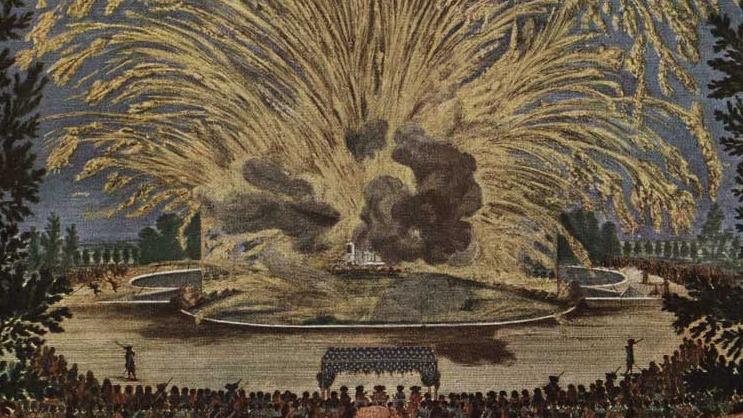Versailles powders.
Versailles is celebrating.
Such is the will of the king.
For the beautiful eyes of Mlle de La Vallière.
He is madly in love with her.
She looks like candy.
The "
Pleasures of the Enchanted Island
" are dedicated to him even though Louis XIV officially dedicated them to the queen mother, Anne of Austria, and to her wife, the indulgent Marie-Thérèse.
Hastily, as always when it comes to satisfying His Majesty, the Duc de Saint-Aignan, in charge of coordinating the entertainment, Jean-Baptiste Lully, Superintendent of Royal Music, Pierre Beauchamp, ballet master, and Molière have been hard at work since April 30.
To discover
Discover the “Best of the Goncourt Prize” collection
Read alsoMichel De Jaeghere:
“Tartuffe is still with us”
Louis XIV arrived on May 5 at his father's former hunting lodge, which he had remodeled and enlarged.
Since then, there are only parades, water games, ring races, dances, songs, gallantries.
On May 8, Molière offers the king La Princesse d'Elide, a hymn to love.
Then he plays again, as during the festivities of Vaux-le-Vicomte, Les Fâcheux, of which the king never tires, and, on the evening of May 12, he creates Le Tartuffe.
How mischievous this comedy is!
Everyone enjoys recognizing, in the devout hypocrite, an abbé of his acquaintance, a killjoy director of conscience or one of those "
flat-footed
with a small collar, without a sword at his side, who only thinks, under the pretext of serving heaven, of thwarting the transports of youth.
Louis XIV, who was not yet twenty-six, was not distressed to see Molière ridicule the "
braggarts of virtue
."
The Jansenists insupport His Majesty;
Bossuet irritated him with his sermons on death and his ambition to build "
Jerusalem in the midst of Babylon
";
as for the Compagnie du Saint-Sacrement, formed in 1630 on the initiative of the Duke of Ventadour, it is suspect to him, just as it was to Cardinal Mazarin who in 1660 had banned all secret societies in order to break his occult influence.
The king knows that she continues to meet.
He only tolerates it because his mother protects her.
When Molière read him the first scenes of
Tartuffe
, the king foresaw that the devotees would be offended, moreover they tried to prevent its performance at Versailles, but Louis XIV refused to hear Anne of Austria who pleaded their case.
The day after the performance of
L'Hypocrite
, the Archbishop of Paris, Mgr Hardouin de Péréfixe, hastened to come and explain to the king the bad effects that this comedy could produce by confusing true and false devotees.
Louis XIV had to give in to his arguments and he forbade
Le Tartuffe
to be performed in public.
Molière will have to be patient.
He does it well himself!
In July, inviting the troupe from the Palais-Royal to come and play The Princess of Elide again at Fontainebleau in the presence of Cardinal Chigi, nephew and legate of the pope, Louis XIV deliberately let Molière read
Le Tartuffe
.
The cardinal sees no harm in it.
But in Paris, the reaction is not long in coming.
Pierre Roullé, parish priest of Saint-Barthélemy, publishes a booklet whose preface is dedicated to His Majesty.
He draws up a violent indictment against the impious and the atheists.
Without quoting the author of
Tartuffe
, he condemns this "
demon dressed in flesh
" to all the fires of hell.
Encouraged by his friends who libertine more often than they go to confession, Jean-Baptiste responds with a petition to the king in which he deals with hypocrisy in general and religious hypocrisy in particular, asking Louis XIV to lift the 'prohibited so that the public can judge its good faith.
All the greats, enchanted by the scandal, demanded a reading of
Tartuffe
.
The comedy will be heard at Monsieur's in his castle of Villers-Cotterêts in the presence of the king and at the Grand Condé, elder brother of the Prince of Conti who was the protector of Molière's troupe in Languedoc but who, since his conversion in 1656, has joined the Compagnie du Saint-Sacrement and was not the least relentless in vilifying Molière.
Did Jean-Baptiste think of Armand de Bourbon while writing
Le Tartuffe
?
Was he still thinking of himself when he began to write
Dom Juan
?
Performed on February 15, 1665,
Le Festin de pierre
is a new triumph.
But for the party of the devotees, it is another offense to heaven.
Faced with a great atheist lord, religion is defended there only by an uneducated valet.
Did Molière go too far?
After the traditional closure of theaters during Lent, he will no longer play
Dom Juan
.
The cover of
Figaro Hors-Série
What's New?
Moliere!
CCO Paris/Carnavalet Museum
"
What's up?"
Moliere!
», 114 pages, €8.90, available on newsstands and
Figaro Store
.

